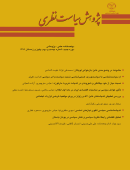از سیاستشناسی تا سیاستورزی: هستیشناسی نسبت سیاست و امر سیاسی
محورهای موضوعی : Research in Theoritical Politics
1 - دانشگاه تبریز
کلید واژه: سیاست امر سیاسی هستیشناسی خود دیگری,
چکیده مقاله :
سیاست به مثابه «فلسفه» در فهم سنتی و به مثابه «علم» در معنای مدرن آن، امکان کسب معرفت عینی از امر سیاسی را به عنوان موضوع مطالعه خود مفروض داشته است. با این حال در دوران معاصر، اندیشهورزی تأملی درباره نسبت نظریه و عمل در قلمرو سیاست، به این نتیجه رهنمون شده است که اندیشیدن دربارۀ امور سیاسی با عمل کردن به صورت سیاسی یعنی با عمل معطوف به قدرت همراه است. بر این اساس پرسش اصلی مقاله این است که فهم ما از رابطۀ سیاست و امر سیاسی با نظر به نسبت امر هستیشناختی و امر سیاسی چگونه متحول شده است؟ فرضیه این است که در تحلیل هستیشناسی سیاسی، سیاست و امر سیاسی درگیر رابطهای متقابل هستند که بر اساس آن، سیاستشناسی و سیاستورزی به مثابه دو روی سکه متجلی میشوند. این رابطه از دو جهت بررسی شده است: اول از روزنه نگاه به امر سیاسی از چشمانداز سنتی و مدرن به مثابه قلمروی خاص از موجودیت یا هستنده و دوم از جهت نگاه به امر سیاسی از چشمانداز هستیشناسی بنیادین در قالب اندیشۀ انتقادی معاصر که از پدیدارشناسی وجودی تا پساساختارگرایی نمود یافته است. در بررسی امر سیاسی به مثابه هستنده، مسائل مربوط به تفاوتهای امر سیاسی با سایر امور اجتماعی اهمیت می یابد. در مقابل، امر سیاسی در وجه هستیشناختی بنیادین آن، ناظر بر مسائلی اساسی درباره چگونگی تکوین زندگی سیاسی از رهگذر تحول در نظر و عمل است. بدین ترتیب ضمن تمرکز بر تحلیل هستیشناسی سیاسی به روشی تأملی یا انعکاسی که روشی ناظر بر تحلیل مسائل نظریهها در سطح درجه دوم یا سطح فرانظری به مثابه یک چارچوب تحلیلی است، تأثیر تحول در فهم رابطۀ علم سیاست و امر سیاسی بر نحوۀ تحول سوژگی ما از حیث چگونگی بازنمایی امر سیاسی بررسی می شود. «خود»اندیشی انتقادی به مثابه محصول کاربست روش تأملی در تحلیل هستیشناسی سیاسی، بر ماهیت متحول فهم رابطۀ خود/ دیگری به مثابه دلالتگر امر سیاسی آگاهی انتقادی مییابد و ضمن بازشناسی وجه سلبی سلطه و تخاصم در آن، درصدد جست وجوی امکانهای جدیدی از هستی سیاسی به صورت ایجابی است که دلالت بر هم فهمی، رهایی و مصالحه داشته باشد.
Politics as a philosophy in traditional understanding and as a science in modern understanding of it, takes for granted the possibility of obtaining objective knowledge of the political as its subject matter. But contemporarily, reflective thinking about the relation between theory and practice in politics, has been concluded that thinking about the political corresponds with acting politically, i.e. intending to power. Thus, the main question of this article is that how our understanding of relation between politics and the political with regard to the relation between the ontological and the political has been transformed? Our hypotheses is that in the analysis of political ontology, politics and the political are entangled in a mutual relation in which politology and political practice act as a two sides of a coin. This relation has been analyzed in two dimensions, first: from traditional and modern perspective of the political as particular entity or something to be and second from the perspective of the political ontologically as a being in itself in the context of contemporary critical thought from existential phenomenology to post-structuralism. In analyzing the political as an entity, issues concerning the differences between political and other social entities gets importance. In contrast, the political in its ontological rendition, deals with fundamental problems about the constitution of political life through transformation in theory and practice. Therefore, concentrating on the analysis of political ontology reflectively as a method concerning the analysis of theoretical issues on the second order or meta-theoretical level that itself defines our theoretical framework, the effect of transformation in understanding the relation between politics and the political on the transformation of our subjectivity in respect to the manner of representing the political, has been studied. Thinking critically about the “self” as a conclusion of implementing reflective method in analyzing political ontology, renders critical consciousness about the transformative nature of self/other relationship as a signifier of the political and also beside detecting the negative dimension of the political as a domination and antagonism, focuses on searching new possibilities of political being positively that denotes to co-understanding, reconciliation and emancipation.
